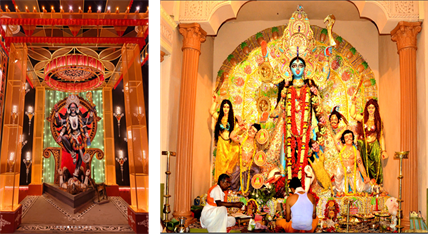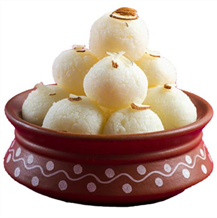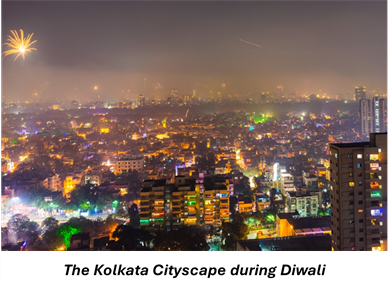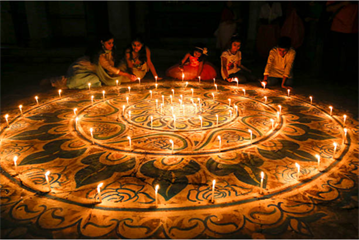Blog: Kali Puja - The Bengali way of celebrating Diwali
Hello, I’m Anwesa Manna, a PhD student in Biosciences at UoB, originally from West Bengal, India. Diwali is celebrated in over 100 different ways across India, depending on regional traditions, cultural beliefs, and local practices—for example, “Konkan Diwali,” “Bengal’s Kali Puja and Deepabali,” “Sikh Bandi Chhor Divas,” and many more. Despite the variety, one theme remains common to all: Diwali is a festival of light, symbolising the triumph of good over evil and light over darkness. As a Bengali, I’d like to share how Diwali is celebrated through the eyes of my community.

Kali: The Feminine Fire
In most parts of India, Diwali is a festival of lights, wealth, and the homecoming of Lord Rama. But in West Bengal, the same new moon night blazes with a different kind of light — the fierce, unapologetic glow of Goddess Kali and it is called “Deepabali” instead of Diwali.

Here, Diwali transforms into Kali Puja, a celebration not just of light over darkness, but of female power over fear, and the awakening of the fierce feminine energy within every woman.
The Fierce Mother, the Gentle Protector
Kali is not the delicate goddess of prosperity; she is the storm. Draped in darkness, adorned with a garland of skulls, standing fearlessly upon Shiva — she represents the wild, untamed force of creation itself. To outsiders, her image may seem terrifying, but to Bengalis, she is the Mother, the Shakti (power) — fierce yet compassionate, destructive yet protective. Kali reminds the world that femininity is not always soft and submissive; it can also be fiery, relentless, and powerful beyond measure.
A celebration of inner strength
Days before the festival, homes and neighbourhoods are cleaned and decorated with alpanas (white rice paste designs) and rows of diyas. The evening before, called Bhoot Chaturdashi, is marked by lighting fourteen lamps to ward off evil spirits and remembering fourteen forefathers for blessings.

Families buy new clothes, prepare sweets like rosogolla, sandesh and narus, and gather all the puja items — red hibiscus flowers, incense, fruits, and offerings for the goddess.
The Night of the Goddess
As dusk falls, Kolkata and towns across Bengal transform into oceans of light. Pandals rise, filled with magnificent idols of Kali — radiant, wild, and magnificent. The sound of dhak, the scent of incense, and the crimson glow of lamps fill the night with sacred intensity.

At midnight, when the world is dark and still, Kali is worshipped. The rituals, the offerings, the chants — all honour her as the destroyer of fear and the protector of truth.
A modern touch
In recent years, many have embraced eco-friendly celebrations — using clay idols, natural dyes, and quieter fireworks. Yet, the essence remains unchanged: a night dedicated to light, strength, and divine energy.

The Feminine Flame
In Bengal’s Diwali, light is not fragile It doesn’t just flicker; it blazes. Her tongue, red and defiant, speaks for every woman who has ever been silenced. Her sword cuts through injustice and oppression. Deepabali is not just a festival. It’s a reminder that within every woman lives a Kali — fierce, fearless, and free. She is the fire that refuses to fade. The power that doesn’t ask for permission.
For Bengalis, Deepabali (Diwali) is not just about brightness — it is about the power of the feminine divine, the courage to face darkness, and the renewal of inner strength. Kali Puja embodies the belief that destruction of evil leads to rebirth and hope.
As the night sky glows with lamps and chants echo through the air, Kali Puja reminds Bengal — and the world — that light shines brightest after the darkest night.
Written by Anwesa Manna
To learn more about how Diwali is celebrated from a Sikh lens, check out our blog.
Get involved in celebrations at UoB
Indian Institute’s free Diwali event
Monday 20 October, 12:00-14:00
Aston Webb
Enjoy live Indian classical music, get creative with diya lamp painting workshops and experience traditional henna hand painting. Sampad artists include renowned sitar player Akash Parekar and talented multi-disciplinary artist Jaya Khazae.
Dishoom and BBC Asian Network Diwali Celebration
Wednesday 22 October, 18:00-23:30
Hockley Social
Light up Birmingham with a night of delicious food, brilliant music, dancing and New Year revelry, with live music from Saloni, Navin Kundra, Parry & Rekha, H-Dhami and Khushi K, and DJ sets from Vallisa Chuhan, Kizzi and AJD.
Bollywood Classics: A String Tribute by the Sekine Quartet
Thursday 23 October, 20:00-21:00
Lapworth Museum of Geology
Come and celebrate during the Diwali season and experience the greatest Bollywood songs.
From everyone at UoB, Happy Diwali to those celebrating!